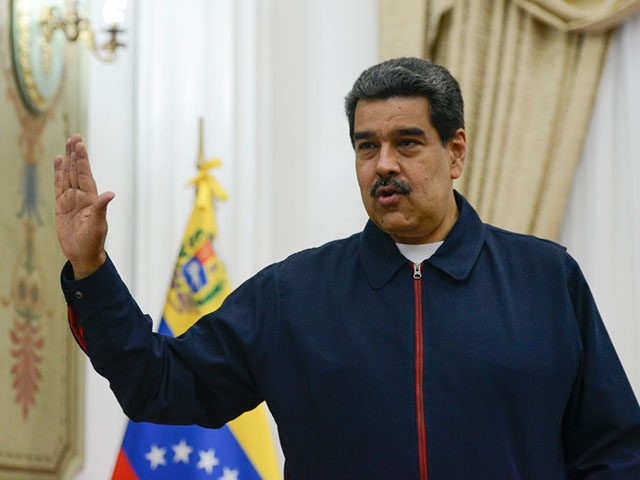Venezuela’s dictator Nicolás Maduro announced on Thursday that he had no intention of attending the United Nations General Assembly floor debate next week, to which he is invited despite not being the legal head of state of the country.
Maduro ceased being president of Venezuela after his “inauguration” in January. As his victory in the May 2018 presidential election was the product of widespread fraud and censorship of non-socialist or communist candidates, the country’s legislature, the National Assembly, used its constitutional powers to remove him.
The current president of Venezuela is Juan Guaidó, whom the United Nations did not invite to address the General Assembly despite his legal status. Despite pressure from the United States and other international actors to respect the Venezuelan constitution, the United Nations has failed to remove Maduro’s envoys from its venue.
Despite the invite, Maduro told viewers on state television Thursday that he could not visit New York next week because he had too much work to do at home.
“I went to New York last year, this year I am not going, this year I am staying here with you working in Venezuela,” he said, “very secure and very relaxed.”
Maduro is sending the nation’s vice president, Delcy Rodríguez, and his foreign minister, Jorge Arreaza, who will reportedly bring a petition signed by socialists condemning U.S. President Donald Trump.
“Delcy and the foreign minister have high-impact voices well-known in the world,” Maduro said.
He did not specify on what work, exactly, he was staying home to do.
“I have a lot of work for the nation, to defend peace in Venezuela, to keep pushing this recovery, growth, and social prosperity plan forward,” Maduro claimed.
The Argentine outlet Infobae reported, citing anonymous sources, that the real reason Maduro felt it imperative to stay in Caracas was his fear that his highest-ranking officials would stage a coup against him. In particular, Maduro reportedly has lost trust in Defense Minister Vladimir Padrino López, who he believes, Infobae claimed, would launch a coup d’etat if Maduro leaves the country for more than 48 hours.
At the United Nations, Arreaza and Rodríguez, two of Maduro’s most loyal soldiers, have been tasked with handing to Secretary-General Antonio Guterres 13 million signatures that Maduro, with the help of the communist regime in Cuba, allegedly collected to condemn President Trump.
“The Venezuelan people say no more embargo, no more sanctions, no more aggression from the empire [America],” Maduro said on Thursday, ordering his henchmen to go “door-to-door” and harass Venezuelans to sign his petition.
Arreaza already appeared at the United Nations Human Rights Council this week, claiming that sanctions on individual Maduro officials for participating in human rights abuses are, in themselves, human rights abuses.
“The goal is crystal clear — to bring the Venezuelan economy to its knees and to prevent the Government from meeting the basic needs of its people as well as to bring about a change of government by unconstitutional means through the use of force,” Arreaza said. “There have been attempts to use humanitarian aid as a weapon against Venezuelan sovereignty.”
Arreaza also argued that allies of the United States should not be allowed to serve on the Human Rights Council. The United States itself withdrew from the council under the Trump administration in protest of its constant condemnation of Israel and lack of action against actual human rights violators.
Arreaza contended:
If members of this Human Rights Council can be accomplices to the imposition of this kind of measure [sanctions] then they shouldn’t be members of this council. We need to look here in this council again at the criteria for the election of members of this council, and when we use those criteria we should take into account the attitude of the member state concerned towards the imposition of unilateral coercive measures.
The Trump administration has questioned why Maduro’s envoys are allowed to participate in United Nations affairs since he does not represent any legitimate government.
“With all due respect, Mr. Ambassador, you shouldn’t be here,” Vice President Mike Pence told Maduro’s ambassador to the U.N., Samuel Moncada, in April. “You should return to Venezuela and tell Nicolas Maduro that his time is up. It’s time for him to go.”
“This body should revoke the credentials of Venezuela’s representative to the United Nations, recognize Interim President Juan Guaidó, and seat the representative of the free Venezuelan government in this body without delay,” Pence continued.
Maduro did give a speech at least year’s General Assembly, declaring that “today, Venezuela is stronger than ever.” Failing to mention widespread food and medical shortages, overwhelming violence largely committed by allies of the region, and the use of torture and murder to silence dissidents, Maduro instead accused Washington of funding a “terrorist attack” against him and urged the world to “resist” America.
Maduro did not attend the 2017 General Assembly; Arreaza told reporters he was “very busy.”

COMMENTS
Please let us know if you're having issues with commenting.